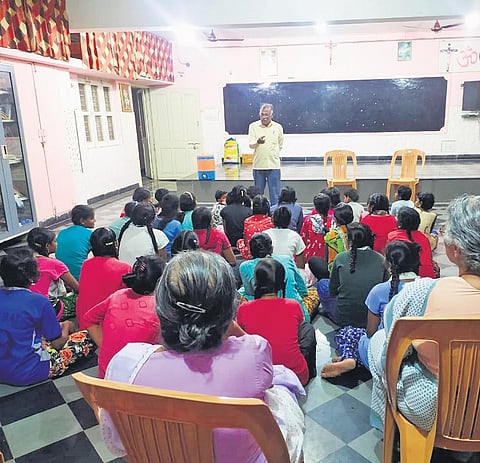

VIJAYAPURA: When Annapurna (name changed) was eight years old, her father brought her to Navasanidhya, a home for HIV-infected children; he was to later die of AIDS. She said he left her at the centre as he was unable to take care of his lone child after her mother’s demise.
Annapurna, who was infected with HIV at birth, was a resident of a village in Vijayapura taluk. Today, at the age of 17, she is completing pre-university at a private college here. “I don’t even remember when my mother died as I was an infant then,” she said. Now, after many years at the centre, the people here have not only become her family but it has also given her a new lease of dignified life.
“If I was not brought here, I would have been forced to marry at an early age, without knowing I was suffering from HIV. I am grateful for having been brought here,” she said. Annapurna wishes to take up LLB and become an advocate.
Similar is the heartrending story of Sridevi (name changed), a resident of Almel taluk of the district, who contracted HIV at birth. She too was brought to the centre when she was around six years old. “Since my father and mother died early, my grandmother took care of me for some time. She brought me here because of financial constraints,” she said.
Sridevi doesn’t remember much about her parents. Like Annapurna, she is also doing PU and desires to become a teacher. “I have no idea what my life would have been like if I had not come here. Today, the centre is my home and my family,” she said.
The fate of orphans
Annapurna and Sridevi are two of the 34 HIV-infected girls residing in Navasanidhya, a centre run by a Christian missionary. It was started in 2008 to provide free shelter, education, food and career to such children. “What prompted us to open this home was a report that many children infected with HIV became orphans, mainly in rural areas, over a decade ago. A majority came from poor financial backgrounds and had little or no education. Because of fast-spreading HIV among parents due to lack of knowledge, the children were getting infected in the womb itself. Children were forced to live on the mercy of relatives,” said Sister Julie Cluny, head of the centre.
The missionary decided to open a home for such unfortunate children and give them a dignified life in society. “We started with one child and gradually, the number started growing, with more children from the district and neighbouring districts joining,” she said.
Till date, the centre has sheltered over 70 children suffering from HIV. When the centre was first started, boys and girls were in the same home. Later, following a government order, the home for boys was moved to a different locality, where around 28 boys reside.
The centre also ensures the children get treatment for HIV. “The District Government Hospital supplies free medicines, we take care of their health for other ailments. Since such children essentially need nutritious food to maintain their immunity against any infections, we take a lot of care to give protein-rich food. As far as education is concerned, based on their age, we send them to schools and colleges and take care of expenditure,” she said.
Though such centres are to admit children from the age of six itself, Sister Cluny said sometimes they are forced to admit even younger children who have no one to take care of them. Such children are admitted after obtaining permission from the Child Welfare Committee (CWC). As per norms, the centre can keep the children only till the age of 18, after which they are to be sent to hostels run by the government in places such as Bengaluru, and gain higher education or undergo skill development training.
Settling down
Sr Cluny claimed that four HIV-infected children have completed higher education and are working as teachers. Five girls are pursuing graduation in Bengaluru, whose expenses are taken care of by the centre.
“Since an HIV-infected person cannot marry a normal person, we have helped find HIV-infected grooms for four of our girls, and they are now settled with their families,” she said.
Most of the children have only some close relatives who they meet. What is dismaying is that often, even relatives don’t show interest in meeting these children. A few who have relatives visit them during holidays,” she said. Even when they turn 18, and the centre has to send them back to their families, they are not accepted.
“We found that family members either refused to take them or kept them unwillingly. The girls came back weeping to us. We had no choice but to accommodate them,” she said.
Sister Cluny said HIV-infected children can live a long and healthy life if they take medicines properly and maintain good health. “We tell them that even HIV-infected people can live a normal life. Since such persons cannot have physical contact with normal persons, we guide and educate them about this crucial aspect,” she said.